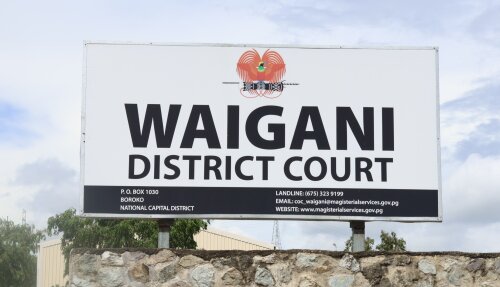Best Antitrust Litigation Lawyers in Port Moresby
Share your needs with us, get contacted by law firms.
Free. Takes 2 min.
List of the best lawyers in Port Moresby, Papua New Guinea
About Antitrust Litigation Law in Port Moresby, Papua New Guinea
Antitrust litigation involves legal disputes covering activities that undermine fair competition within markets. In Port Moresby, Papua New Guinea, antitrust matters are primarily regulated under national laws that seek to foster competitive business practices and protect consumers. These laws prevent companies or individuals from engaging in anti-competitive behavior such as price fixing, market monopolization, and collusive agreements. Antitrust litigation often arises when a business or consumer brings a complaint about suspected unfair marketplace practices, leading to investigations, civil actions, or regulatory responses.
Why You May Need a Lawyer
You may need a lawyer experienced in antitrust litigation in Port Moresby for several situations, including:
- If your business is accused of violating antitrust laws, such as price fixing or abuse of market dominance.
- If you are affected by anti-competitive practices, like exclusive supply agreements or unfair trade restrictions.
- If you are facing investigations or enforcement actions by regulatory authorities.
- If your company wants to ensure ongoing compliance with local competition laws when entering mergers or acquisitions.
- If you are seeking damages for losses suffered due to another company's anti-competitive conduct.
A lawyer can help interpret complex laws, represent you in negotiations or court, liaise with regulators, and protect your rights and interests throughout the process.
Local Laws Overview
Antitrust laws in Papua New Guinea are detailed under the Independent Consumer and Competition Commission Act 2002. This legislation governs most competition-related issues in Port Moresby. Key aspects include:
- Prohibiting agreements or arrangements between businesses that substantially lessen competition, such as cartels or collusive tendering.
- Restricting misuse of market power, preventing dominant businesses from using their position to harm competitors or consumers.
- Monitoring and, if necessary, controlling mergers and acquisitions that may result in reduced competition in markets.
- Empowering the Independent Consumer and Competition Commission (ICCC) to investigate suspected infringements, issue fines, and take legal action.
- Providing mechanisms for affected parties to seek remedies including injunctions and compensation.
It is crucial to recognize that both civil and criminal penalties can result from breaches of antitrust law. Legal advice is recommended if you believe you are affected by or accused of such practices.
Frequently Asked Questions
What is considered anti-competitive conduct in Papua New Guinea?
Anti-competitive conduct includes any agreement, arrangement, or business practice that limits competition, such as price fixing, market sharing, or blocking access to supplies or distribution channels.
Who enforces antitrust laws in Port Moresby?
The Independent Consumer and Competition Commission (ICCC) is the main regulatory body responsible for investigating and enforcing antitrust laws in Papua New Guinea.
Can individuals bring antitrust cases or only the ICCC?
Both individuals and businesses that have suffered loss due to anti-competitive conduct can bring civil proceedings in courts, separate from regulatory actions by the ICCC.
What penalties exist for violating antitrust laws?
Penalties can include substantial fines, orders to cease illegal practices, compensation to affected parties, and in some cases, criminal prosecution of responsible individuals.
Are all mergers and acquisitions subject to antitrust scrutiny?
Not all transactions require review, but those that may have a significant impact on market competition are subject to ICCC scrutiny and may be blocked or conditioned.
How does the complaint process work?
Affected parties can lodge a complaint with the ICCC, which will undertake an initial investigation. If there is enough evidence, the ICCC can initiate enforcement action or litigation.
What should I do if my business is under investigation?
It is important to seek legal advice immediately, provide accurate information to investigators, and avoid obstructing the process. A lawyer can guide on compliance and defense strategies.
Can foreign companies be investigated for antitrust issues in PNG?
Yes, if their conduct affects competition within Papua New Guinea markets, foreign companies can be subject to investigation and enforcement by the ICCC.
What defenses are available in antitrust litigation?
Common defenses include demonstrating that conduct did not substantially lessen competition, showing pro-competitive justifications, or compliance with legal exemptions.
How long do antitrust investigations or cases usually take?
Timelines vary based on case complexity, but initial investigations by the ICCC can take several months, while court litigation may extend longer depending on the evidence and legal arguments involved.
Additional Resources
For further guidance and support regarding antitrust litigation in Port Moresby, you can turn to:
- Independent Consumer and Competition Commission (ICCC) - The primary agency for regulation, guidance, and enforcement of competition law in Papua New Guinea.
- Papua New Guinea Law Society - Lists practicing lawyers and firms specializing in commercial and antitrust law.
- Consumer Protection Groups - Offer information and advocacy for individuals and businesses affected by anti-competitive practices.
- Commercial Law Faculties at Local Universities - Can provide research resources and educational materials related to competition law.
Next Steps
If you believe you need legal assistance with an antitrust issue in Port Moresby, consider the following steps:
- Document any evidence of potential anti-competitive behavior, including communications or agreements.
- Consult a qualified lawyer or legal firm with experience in antitrust litigation to evaluate your case.
- Contact the ICCC if you wish to file a formal complaint or seek regulatory intervention.
- Keep detailed records of all interactions and communications related to the potential issue.
- Follow legal advice closely to ensure compliance and protect your interests throughout any investigation or legal proceedings.
Seeking timely professional advice is crucial to navigating antitrust laws in Papua New Guinea and ensuring the best possible outcome for your situation.
Lawzana helps you find the best lawyers and law firms in Port Moresby through a curated and pre-screened list of qualified legal professionals. Our platform offers rankings and detailed profiles of attorneys and law firms, allowing you to compare based on practice areas, including Antitrust Litigation, experience, and client feedback.
Each profile includes a description of the firm's areas of practice, client reviews, team members and partners, year of establishment, spoken languages, office locations, contact information, social media presence, and any published articles or resources. Most firms on our platform speak English and are experienced in both local and international legal matters.
Get a quote from top-rated law firms in Port Moresby, Papua New Guinea — quickly, securely, and without unnecessary hassle.
Disclaimer:
The information provided on this page is for general informational purposes only and does not constitute legal advice. While we strive to ensure the accuracy and relevance of the content, legal information may change over time, and interpretations of the law can vary. You should always consult with a qualified legal professional for advice specific to your situation.
We disclaim all liability for actions taken or not taken based on the content of this page. If you believe any information is incorrect or outdated, please contact us, and we will review and update it where appropriate.














